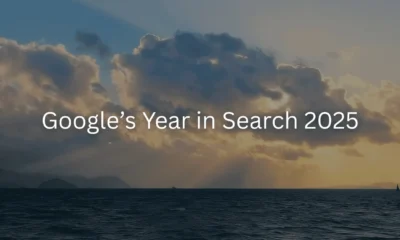NEWS
Google Passage Ranking – Martin Splitt Answers Questions via @martinibuster
Google’s Martin Splitt got together virtually with Cindy Krum, Bartosz Goralewicz and Tomek Rudzki to discuss Google’s new ranking system that Martin insisted was more accurately called Passage Ranking.
Will Passages Help Long Web Pages?
Bartosz asked about passage indexing, stating that what he knows is that passages is going to help users with long form content by ranking a small section of the article,
“Yes, pretty much. That’s the core.”
Martin then stated that he wasn’t excited by the original blog post framing it as “Passage Indexing.”
“While I’m not super excited about us framing it… originally as passage indexing, it is actually a ranking change.
Martin then suggested calling it Passage Ranking.
“Yes, I would call it Passage Ranking, that makes sense.”
What Should Publishers Do About Google Passage Ranking?
Bartosz then asks if we need to do anything specific in response to this new algorithm.
Martin shakes his head, indicating no.
“No. That’s a change that is pretty much purely internal and there is nothing that you need to do, you don’t need to make any changes to your website, you don’t need to make changes to any of your pages, to any of your articles or to your markup.
There is no special special thing that you need to do.
It’s just us getting better at more granularly understanding the content of a page, and being able to score different parts of a page independently.”
Advertisement
Continue Reading Below
Should Publishers Review and Rewrite Heading Elements?
Bartosz then asks if tightening up the use of heading elements in order to better communicate what the different sections of a page are about will help or if Google will understand the content regardless of the markup.


Martin answered:
“It’s pretty much that. With any kind of content some semantic and some structure in your content so that it’s easier for automated systems to understand the structure and the kind of like, the bits and pieces of your content.
But even if you would not do that we would still be able to say like… this part of the page is relevant to this query where this other piece of your page is not as relevant to this query.”
Advertisement
Continue Reading Below
What if SEO Agencies and Software Publishers Claim Passages Optimization?
Bartosz then asks Martin’s opinion on the scenario of an SEO agency or an SEO software publisher making the claim of being able to optimize for Passage Ranking.


Martin chuckled, as if trying to restrain himself but then broke out into full laughter before answering the question.
He said,
“How do I put this nicely… uhm…”
Martin shrugged and said,
“Each to their own I guess! Sure…”
Then he became a little more reflective and answered:
“Oomph… There will probably be some people who will try to capitalize on this. But I wouldn’t fall for it.”
Next Bartosz asked Martin to name some top misunderstandings of what Passage Indexing is.
“I think that the core myth is that it’s a thing. Because really it is just a smaller change where we try to help those who are not necessarily familiar with SEO or are how to structure their content or content strategy.
Because lots of people end up creating these long-winded pages that are having a hard time ranking for anything, really because everything is so diluted at this long content. We are helping those.”
Martin next suggested that if you have a grasp on how to organize content that this (passages ranking) is pretty much not applicable.
“If you are in this webinar, then I would assume that you have some grasp of the topic and that you have some strategic content on how to structure your content in the first place, that this is pretty much not for you. It’s not really that you need to pay attention to or worry about.”
Advertisement
Continue Reading Below
Passage Ranking Effect on Ecommerce
Bartosz followed up by asking if Passage Indexing would apply to eCommerce situations, for example on a very long product category page.
Martin answered that it was unlikely because there isn’t enough content in that scenario for the passages ranking to apply.
This is how he answered:
“Unlikely because normally there isn’t that much content around the specific bits in the category that we would consider a passage.
…Unless it’s textual content, it doesn’t really benefit from this.”
He then pointed out the practical aspect of a product query in that a specific product page is what should be outranking a category page for a product query.
What’s the Difference Between Featured Snippet and Passages Ranking?
Cindy Krum asked Martin to clarify what the difference is between passages and featured snippets.
Martin responded that internally featured snippets is a completely separate system. He explained that the featured snippet will take a “self-contained”
answer that’s in a page and then place that into an “instant answer” type context and called it a “very simple thing.”
Advertisement
Continue Reading Below
By Instant Answer he means a search query that doesn’t need an in depth answer but can be answered with a few sentences or less. An instant answer typically may not need to be clicked through to the site but read right there in the search results.
By contrast, Martin said that a passages type result would be a page that might not necessarily give a concise answer and would be more of a “blue links” type search result.
He then reiterated that featured snippets and passages ranking are not the same and are different systems.
He added, in response to a follow up question, that he was unsure if the implementation would allow the simultaneous ranking of a featured snippet and passages ranking for the same content.
Passage Ranking and Subtopics
Tomek Rudzki asked if there were any intersections between the neural net understanding of Subtopics and Passages.
Subtopics is a reference to Google’s ability to show a diversity of answers for broad search queries.
Advertisement
Continue Reading Below
This is how Google’s blog post explained subtopics:
“We’ve applied neural nets to understand subtopics around an interest, which helps deliver a greater diversity of content when you search for something broad. As an example, if you search for “home exercise equipment,” we can now understand relevant subtopics, such as budget equipment, premium picks, or small space ideas, and show a wider range of content for you on the search results page. “
Martin responded that these were two different things. Subtopics were a way of understanding queries, a way to give users “ways of zooming in to the content.” He said Subtopics is a way of understanding things and Passages is a ranking thing.
What’s the Connection Between BERT and Passages?
Cindy Krum brought up how the official Google announcement talked about BERT in the context of Passages.
Martin indicated that BERT is a way of understanding content and that of course, before the Passages ranking can happen, Google needs to understand the content. He stressed that these are related but different things.
Advertisement
Continue Reading Below
Martin looked up in the air and took a breath as he tried to work out in his mind how to explain this seemingly complex relationship.
Martin answered:
“The problem here is there’s like lots of smaller systems talking to each other, so everything is blurry. There is no clear separation between the things.
But for me, how I look at it, is when we talk about Passages as a thing you see in search results ranking, that requires that we understand the document, of course.
We can’t say like… this Passage is about this thing if we don’t understand that. But then there’s this other understanding which is more like, how does this relate to things and how does this get disambiguated from other similar topics and other similar entities?
Extracting these concepts and extracting how this relates to each other is a separate process internally for us than it is to understand what this page is about.
…It’s related, but it’s completely separate processes. …Without natural language understanding we can’t do either of these things.
But in this case, Passages is a ranking feature where we say like, …this page covers these five different topics and one of the topics is this specific tomato kind, for instance… whereas the rest of the page talks about cucumbers and gardening in general.”
Advertisement
Continue Reading Below
Tomek asked when will Passage Ranking be Introduced.
Martin responded that it’s supposed to go live in December but that it might go live in 2021.
Martin Affirms Which Sites Benefit from Passages
Martin insisted there is nothing to do to optimize for passages because it’s designed to help sites that aren’t ranking as well as they should.
“Again, if you have a website that ranks well, it’s not really a problem for you.
We are only improving rankings for pages that are currently having trouble.”
Q: Will passages show up in a different feature, like People Also Ask?
Martin answered probably not, that Passage Ranking is
strictly a blue links feature. By blue links he means the traditional search results.
Q: Are there any guidelines for how long or short a passage has to be to be considered passages?
Martin answered that he doesn’t think that there is a specific guideline.
Then he said:
“Because again, this is based on what the algorithm picks up and that’s machine learning, so that can change at any point in time.
And it can be really short, it can be as short as a few words, it can be as long as a paragraph I would guess.”
Advertisement
Continue Reading Below
Martin paused then exclaimed,
“Or maybe longer, I don’t know.”
Q: Can a passage with the answer in the body copy outrank a page with the query in the page title?
Martin replied that it’s an interesting question. He thought about it then responded with a rhetorical question, asking if a page with a good answer in the body is more relevant than a page with the query in the page title.


Bartosz responded that if he had to answer the rhetorical question, he would say that relevance is more important than whether a keyword phrase is present in the page title.
Advertisement
Continue Reading Below
Martin raised his arms and exclaimed with a smile, “Ta-da!”
The next question asked if there would be a jump anchor like with some featured snippets and he responded that he didn’t know.
A jump anchor is a Chrome browser feature where a URL can be configured with extra parameters that when the link is clicked will cause Chrome to jump to a specific passage in a page and also highlight it with yellow.
Q: Will Passages be tested before rolling out?
Martin guaranteed that it will be tested before rolling out and when it does roll out that it will be done bit by bit and not all in one go.
He said that, similar to the HTTP/2 crawling rollout, they’re going to do it in smaller batches and see what happens as they roll it out.
He then reiterated that there is nothing for publishers to do, that passages is for web pages that aren’t ranking well and don’t have good structure or well focused pages to also begin to rank for queries. Martin underlined the point that Passages is for helping publishers who may not have the best optimized pages.
Advertisement
Continue Reading Below
He said:
“It just, again, allows pages that are not ranking well and don’t have a good structured content to begin with or have like focused pages to begin with, to also potentially rank for queries.”
Martin then repeated that Passage Ranking is not something that will affect a publisher with good SEO practices.
“It’s not for you who know what they are doing.
If you know what you are doing, passage ranking… will be the least interesting thing that has ever happened to you.
If you have good relevant well structured content, I would be surprised if a random passage on a really long page is magically so good that it outranks you. And if it does…”
 Martin Splitt said, “If it does…” then gestured in a way that seemed to say, “Why do you think?”
Martin Splitt said, “If it does…” then gestured in a way that seemed to say, “Why do you think?”
Martin gestured in a way that to me seemed to mean, that if a passage outranks you, then perhaps your page wasn’t as relevant.
Advertisement
Continue Reading Below
Google Passage Testing Tool?
Regarding the question if there will be a “fetch and render” tool that will let you know if your page might qualify for passages, Martin explained why that’s not possible.
“It’s not something that you can take that much action on unless you restructure your content or rewrite your content.
And there’s no tool to like check ranking really, at least we are not providing any way of doing that.
And it’s not a change in indexing, it’s not a change in rendering, it’s not a change in crawling. So none of the technical aspects that you have control over.
…So there will not be a Passage testing tool.”
What Changes After Passage
Martin tried to explain what Passage Ranking is in the most simple terms, apologizing if his aptitude for simplification isn’t up to the task.
He said that before Passages, the algorithm would identify the main content, ignoring the footer, navigation and so on.
Advertisement
Continue Reading Below
Once identified, Google tries to figure out what the page is about.
“What it used to do is try to figure out what is this page about by basically looking for one subject. What is likely the main thing that this is covering.
And then you had, maybe you had a few pages that were really laser focused… so it was easy for us to say, oh yeah, this is about tomatoes, this is about a cucumber, this one over there is about avocados… cool.
But what if you actually somehow, for some reason, because you didn’t really know what you were doing, you have this one huge web page, that talks about all the different vegetables.
…If you have one huge page with all the vegetables on them, what is this page about?
Well vegetables. Okay.
But if I then look for very specific information… then I’m searching for that specific thing then this page is tricky. because in ranking, we look at all the pages we have on this specific topic… and there are a few pages that are specifically about this… and then there is this other page that’s about all sorts of vegetables.
Advertisement
Continue Reading Below
So now we have this problem of how do we rank these two different pages?
We have this page that is very specific on this thing and the other page is very specifically not on this thing but on all sorts of vegetables.
Well historically we have been limited by our language understanding to say like Okay so the page that covers all these vegetables isn’t scoring as high isn’t ranking as high because it’s not very focused on the thing that the user is asking us for.
Whereas this other page is very specifically addressing the question that the user is asking us.
Now with passage indexing we can say that oh this page is about vegetables and this part is about this specific kind of tomato.
And then we can compare what we know about this specific part of the page that is covering the tomato to the other passage that happens to be a full page actually that is also talking about this tomato.
Advertisement
Continue Reading Below
And then we can say more granularly can say like …this passage might just be part of a larger page but it has lots of really good pieces of information…
Whereas the other one is basically like saying yeah this is a kind of tomato…
And that allows us to more granularly rank these different things against each other.
It does not mean that we are storing them differently. It does not mean you have to do something specific about it.
You just need to make sure that your content is relevant and good to the queries you want to be ranking for.
…We can now be more specific about the different topics, that we can actually rank them more granularly.
…Beforehand we couldn’t. Before hand we had the ability to say like ok this page is mostly about dogs. We would also score it for cats.
…Whereas now we can say, yeah, the page itself is not a good candidate but actually it is a better candidate than what we would have said beforehand.
Advertisement
Continue Reading Below
Because we can now say that there is only that 10% cat content… but this is pretty relevant to the query in question.”
Asked if the goal was to dis-incentive the creation of thin content on highly specific content, Martin said no, that’s not the goal at all.
He reaffirmed that the goal was to help pages that had great content buried in bad content structure.
Martin then repeated that publishers and SEOs who know how to create well structured content don’t have to worry about Passages. Passages is for publishers with great content that is diluted by the other content on the page.”
Asked whether mobile first indexing and rendering has anything to do with Passages, Martin answered no. He explained that Mobile first indexing has nothing to do with ranking and nothing to do with rendering.
He went further by saying that mobile first indexing has nothing to do with and ranking and has nothing to do with rendering.
Advertisement
Continue Reading Below
Rendering, mobile first indexing and passages are all from different parts of the infrastructure.
Possible to Opt Out of Passage Ranking?
Bartosz asked if it was possible to opt out of Passages.
Screenshot of Martin Splitt Chuckling at Idea of Publishers Opting-out of Ranking


Martin laughed out loud because the meaning of the question was inherently absurd in that, why would anyone want to opt out of ranking?
Advertisement
Continue Reading Below
“If you just want a blue link, then I’m very happy to tell you that a Passage is just a blue link. Good, then we’re on the same page.
No… that’s like saying I don’t want to rank for these five paragraphs of my page.”
Are Passages Considered as Different Documents?
Someone asked if Passages were handled as different documents.
Martin answered no, they are considered as one document with multiple annotations and in ranking can be scored independently. One document that can be scored with multiple scores according to the queries that it potentially may be a candidate for.
Regarding the annotations on a web page, he said there are all sorts of scores and identifiers, bits and pieces attached to it, like a folder with lots of information.
He revealed that how documents (web pages) look internally is that they look like collections of information, including the content, which he referred to as the smallest part of the information. He said that it’s not an HTML page with a score attached to it, that it’s more complicated than that.
Advertisement
Continue Reading Below
Could Passage Ranking Give High Authority Sites an Advantage?
Someone asked whether higher authority sites might have an advantage under passage indexing.
“Could passage indexing imply that higher authority websites might rank better for longtail keywords even if they don’t have a dedicated page for it than more unknown websites?”
Martin insisted that the question is mixing different things. He said that question is mixing “authority” with content structure and that’s a ranking question where he would have to discuss ranking factor weightings, something that’s Google does not discuss in public.
Can Sites with Bad Content Structure Rely on Passages?
Martin discussed how Passage Ranking is for publishers whose pages are not properly structured. But he also warned that sites with poorly structured content should not rely on Passages to help their pages rank.
Is it Worthwhile to Combine Long Tail Topics into Larger Documents?
Bartosz raised the scenario of a publisher that is making pages that address highly specific longtail topics that might have two queries a year. He asked if it would be better to join all those hyper-specific granular pages into a larger document of related topics.
Advertisement
Continue Reading Below
Martin said that publishers could try that out but said that he doesn’t know if that would pay off because Passages is an automated system. He cautioned that he wouldn’t strategize on this too much.
He said that the intention was not to encourage publishers to rewrite their content. He said that it’s about helping sites that wouldn’t ordinarily rank to rank. He said that he wouldn’t try to capitalize on it.
He said that joining the long tail content might work, but that he didn’t actually know if it would play out in a specific way.
Citation
Watch the Search Engine Journal Webinar with Google’s Martin Splitt
Google Passages – What They Are & What They Are Not
[embedded content]



![How AEO Will Impact Your Business's Google Visibility in 2026 Why Your Small Business’s Google Visibility in 2026 Depends on AEO [Webinar]](https://articles.entireweb.com/wp-content/uploads/2026/01/How-AEO-Will-Impact-Your-Businesss-Google-Visibility-in-2026-400x240.png)
![How AEO Will Impact Your Business's Google Visibility in 2026 Why Your Small Business’s Google Visibility in 2026 Depends on AEO [Webinar]](https://articles.entireweb.com/wp-content/uploads/2026/01/How-AEO-Will-Impact-Your-Businesss-Google-Visibility-in-2026-80x80.png)













